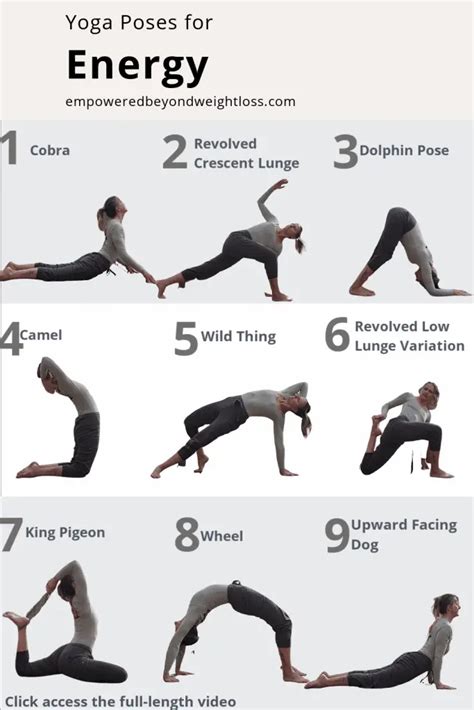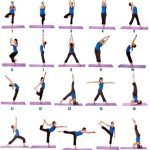Revitalize Your Day: 4 Energizing Yoga Sequences to Boost Vitality
Feeling low on energy? Whether it’s mid-morning fatigue, a post-lunch slump, or simply waking up without that spark, yoga offers a powerful solution. With the right sequences, you can energize your body, clear your mind, and reset your focus. These four carefully crafted yoga sequences will help you restore vitality and stay centered throughout the day, no matter when fatigue strikes.
Introduction: Why Yoga is Perfect for Energy Restoration
Yoga is not just about flexibility or mindfulness—it’s a tool for managing energy. Unlike stimulants like caffeine, yoga taps into your body’s natural rhythm, activating dormant energy and promoting sustainable alertness. The practice triggers the parasympathetic nervous system while gently stretching muscles, creating a unique combination of relaxation and activation. Yoga enhances blood circulation, optimizes oxygen delivery, and aligns your breath with your physical state.
In this guide, we introduce four targeted yoga sequences designed to combat different types of fatigue—morning grogginess, afternoon slumps, long work hours, and emotional exhaustion. These sequences address both the mental and physical aspects of energy loss. Let’s explore the sequences, key postures, and practical tips to incorporate them seamlessly into your routine.
Key Concepts: Understanding Energy from a Yogic Perspective
- Prana: In yoga, “prana” refers to life force or energy. Breathwork practices like pranayama are designed to harness and regulate this energy.
- Chakras: Energy centers in the body that, when blocked or imbalanced, can cause mental or physical fatigue. Certain poses target specific chakras to restore energy flow.
- Sympathetic vs. Parasympathetic Activation: Yoga promotes relaxation while engaging muscle groups, making it a balanced energy booster rather than a stimulant.
- Vinyasa Flow: Linking movement with breath increases blood flow, generating internal warmth and vitality.
Historical Context: Ancient Practices of Energizing Through Movement
The concept of using movement to regulate energy dates back to ancient India. The practice of sun salutations (Surya Namaskar) has been used for centuries to greet the day and invigorate the body. Yogis also developed pranayama to control the breath and awaken mental clarity. Historical texts like the Hatha Yoga Pradipika emphasize the interplay between physical and mental energy, noting how specific postures and breathing patterns can boost endurance and reduce lethargy.
Sequence 1: Morning Energy Boost with Surya Namaskar
This sequence wakes you up gently and helps shake off any residual sleepiness. It stretches the entire body, warms up muscles, and focuses your mind for the day ahead.
- Start with Mountain Pose (Tadasana): Stand tall, connect to your breath, and center yourself.
- Transition into Forward Fold (Uttanasana): Release tension in your back and legs.
- Flow through Low Lunge (Anjaneyasana): Open your hips and engage your lower body.
- Move into Downward Dog (Adho Mukha Svanasana): Stretch your spine and activate your shoulders.
- Close with Cobra Pose (Bhujangasana): Open the chest and energize your core.
Sequence 2: Midday Reboot for Mental Clarity
This sequence combats mental fog and increases focus, making it ideal for lunchtime or between meetings.
- Seated Forward Bend (Paschimottanasana): Relieves lower back stiffness and clears your mind.
- Cat-Cow Pose (Marjaryasana-Bitilasana): Stimulates spinal flexibility and energizes the nervous system.
- Eagle Pose (Garudasana): Engages focus and releases shoulder tension.
- Tree Pose (Vrksasana): Improves concentration and balance.
Sequence 3: Energy Reset After Long Hours of Work
After sitting for prolonged periods, this sequence targets postural fatigue and awakens tired muscles.
- Seated Side Stretch: Lengthens the spine and opens tight muscles.
- Chair Pose (Utkatasana): Activates legs and promotes stability.
- Twisted Lunge (Parivrtta Anjaneyasana): Stimulates circulation and releases back tension.
Sequence 4: Evening Recharge for Emotional Exhaustion
This restorative sequence is perfect for winding down without draining the last reserves of energy.
- Child’s Pose (Balasana): Calms the nervous system.
- Legs Up the Wall (Viparita Karani): Relieves fatigue and promotes blood flow.
- Reclining Butterfly Pose (Supta Baddha Konasana): Opens the hips and relaxes the heart area.
Stakeholder Analysis: Who Benefits from Energizing Yoga Sequences?
| Group | Specific Benefit |
|---|---|
| Office Workers | Reduces stress and boosts productivity. |
| Athletes | Aids recovery and enhances endurance. |
| Students | Improves concentration and learning ability. |
Implementation Guidelines: Incorporating Yoga into Your Routine
- Start small with 10-minute sessions and gradually increase the duration.
- Integrate breathwork with each pose for maximum effect.
- Use props like yoga blocks or straps if needed.
- Listen to your body and adjust postures accordingly.
Ethical Considerations: Inclusivity and Accessibility
Yoga should be inclusive, accessible, and adaptable for people of all abilities. Practitioners should avoid competitive attitudes and focus on personal progress. Additionally, instructors must respect the cultural origins of yoga and promote it authentically.
Limitations and Future Research
- Some individuals may require medical clearance before starting yoga practices.
- Research is still evolving on yoga’s long-term effects on chronic fatigue.
- Future studies could explore the impact of yoga on energy at the cellular level.
Expert Commentary: Synthesizing Diverse Perspectives
Yoga offers a holistic approach to energy management by addressing both mind and body. Experts across disciplines—from physiology to psychology—agree that yoga enhances sustainable energy levels. The challenge lies in individualizing practices to suit different needs. With continuous research and innovation, yoga will likely play an increasingly prominent role in energy restoration strategies worldwide.








